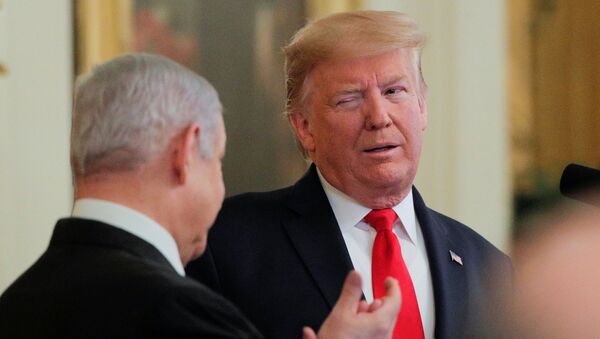As the Israeli-UAE deal is expected to change the geopolitical situation in the Gulf region, Sputnik spoke to Ambassador Talmiz Ahmad, former Indian envoy to Saudi Arabia, Oman, and the UAE, about the implications of the agreement for peace in the region and New Delhi's role in the emerging strategic scenario.
Life Jacket for Trump and Netanyahu
Talmiz Ahmad believes that the deal was concluded at the behest of the UAE, which has been anxious to build a role for itself in regional affairs and by extension in world affairs. Crown Prince of Abu Dhabi Sheikh Mohammad Bin Zayed has been assiduously pursuing this agenda, as he believes the UAE has the wherewithal - the financial resources, energy resources, and the cultural and social standing, entitling it to this role, he added.
"It is basically a UAE initiative to support the political fortunes of two beleaguered leaders. Both Donald Trump and Benjamin Netanyahu are facing serious political difficulties at home and their political future is seriously in doubt. This is meant to give some degree of boost to these people, both thoroughly discredited leaders", opined the former Indian diplomat.
According to Ahmad, the UAE believes that by linking itself with the Americans, it could become a partner of the United States in their strategic endeavours in the Gulf and by extension, boost its larger regional role.
The former envoy suggested the UAE understood that Israel was central to the American political scenario as it carries extraordinary clout particularly with conservatives and the Republican Party.
"If you can keep Israel on your side, it appeases a large number of lobbies in the US and they become your partners and friends", he added.
If a major Arab country dramatically establishes diplomatic ties with Israel, obviously the lobbies would be very satisfied because it effectively condones Israeli policies in the region – aggressive policies, he said.
Impact on Palestinians
Talmiz Ahmad did not think that the deal between the Israelis and the Arab nation would have any impact on the Palestinian cause.
"The Arab people are very committed to the Palestinian cause, but their governments are not", he felt.
The deal, Ahmad believed, was done for a short-term political advantage to build up a diplomatic relationship, which has nothing to do with the Palestinian cause.
Palestinian President Mahmoud Abbas has termed the move a "betrayal". His spokesperson said, the "Palestinian leadership rejects and denounces the UAE, Israel, and US, trilateral, surprising announcement".
Peace Deal and India
"It has nothing to do with India. India's approach to the region has been bilateral and transactional. It is not politically engaged with the region except on a bilateral basis and it has built up relationships with a wide variety of countries, some of them may be in conflict with each other", said Talmiz Ahmad.
The former Indian diplomat said New Delhi has opted out of seeking to play any serious constructive role in promoting security in the region.
"To my mind, it was very well placed to do so, but with the priority being given by the Indian government to domestic issues, and re-shaping the Indian political order at home, this opportunity to actually play a constructive role in regional affairs has been given up", he said.
Ahmad explained that India's formal position has not changed. He termed New Delhi's support for the Palestinians as "lip service". On the other hand, India has built substantial relations with Israel anchored on defence ties.
New Delhi has not officially commented on the announcement made by President Trump so far.
The UAE is the first Gulf state and the third Arab nation - after Egypt and Jordan to announce active ties with Israel.






